The hardest job kids face today is learning good manners without seeing any – Fred Astaire
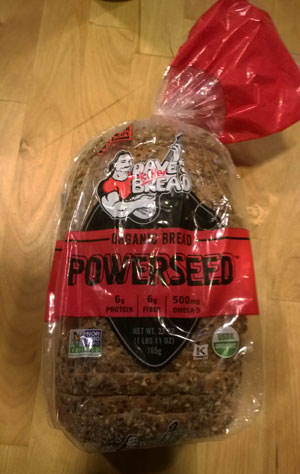 I had a strange encounter at the grocery store the other day. The man in front of me in the checkout line accidentally dropped a loaf of bread while putting the rest of his groceries on the counter to pay for them. I picked it up and handed it to him. He grabbed it from me, then paid for his food and left. Weird, right?
I had a strange encounter at the grocery store the other day. The man in front of me in the checkout line accidentally dropped a loaf of bread while putting the rest of his groceries on the counter to pay for them. I picked it up and handed it to him. He grabbed it from me, then paid for his food and left. Weird, right?
Okay, I admit that it may not seem that bizarre or intriguing, but it’s not what happened that made that moment notable to me. It’s what didn’t happen.
A few minutes later, I realized that the man hadn’t thanked me for picking up his bread.
Now, I don’t really go around performing microscopic acts of kindness for random strangers expecting a ticker tape parade in return. However, when two human beings interact, even in the smallest of capacities, it’s nice to acknowledge the other’s existence through a small smile of appreciation, a nod of recognition, or eye contact of some kind, none of which I received on that fateful day in the grocery store.
You may be wondering why I appear to use this post to vent personal frustrations, or what on earth this seemingly trivial story has to do with outdoor education. Stay with me, because it’s important:
High Trails may be a science school, but beyond the lesson plans of plants, birds, and mammals; we also emphasize the importance of interpersonal relationships to our students, no matter how small the interaction.
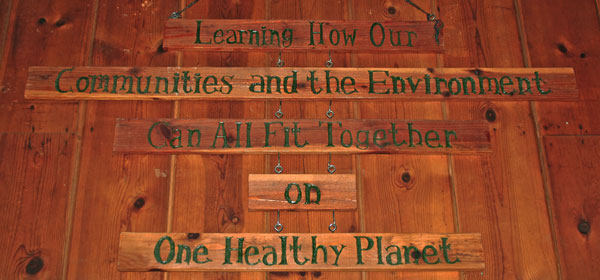
Everywhere at High Trails, opportunities abound to both reinforce and model behavior that not only demonstrates a mastery of basic manners, but also a deep respect for a diverse group of adults and peers. Nowhere is this more evident to me than in the dining hall.
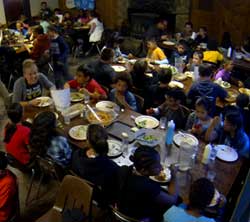 The minute doors open for a meal, students sit at tables with a mixed group of their classmates, integrated with the hope that they will spend the next thirty minutes interacting with someone they may not know particularly well. I remind the students sitting with me of polite ways to ask for food from the other end of the table, in the hopes that they will spend less time reaching their arms in front of each other’s faces, and more time looking at each other’s faces, talking, and getting to know one another.
The minute doors open for a meal, students sit at tables with a mixed group of their classmates, integrated with the hope that they will spend the next thirty minutes interacting with someone they may not know particularly well. I remind the students sitting with me of polite ways to ask for food from the other end of the table, in the hopes that they will spend less time reaching their arms in front of each other’s faces, and more time looking at each other’s faces, talking, and getting to know one another.
At the minimum, if students interact with either a peer or adult in no other capacity than to ask for food, then at least they have done so in a way that is polite and respectful. However, cultivating polite behaviors and respect for others requires more than proverbial slaps on the wrist and gentle reminders to our students.
As instructors, it is our job to model the very mannerisms we expect to see from them.
Addressing groups of students as “ladies and gentlemen,” and saying “please” and “thank you” when you speak to your students is just the beginning. Showcasing politeness is the first step toward showcasing respect.
Nearly every group of students, especially single-gender cabin groups, considers one or two of its members “outcasts,” and I make it my goal each week to include those students in every possible way, from choosing the game the group plays to validating their responses to questions, however far from the mainstream they may seem to other students.
In this way, I hope to demonstrate that all students deserve equal respect, no matter if they are considered “popular” or not.
This deep understanding of respect for others won’t suddenly strike a 6th grade student in a mere week at science camp. However, as instructors, we can help them take that first step, using those building blocks of politeness, those “pleases and thank yous” that hang on the Manners Ladder in the dining hall, to develop the most basic understanding of respect: politeness towards others.
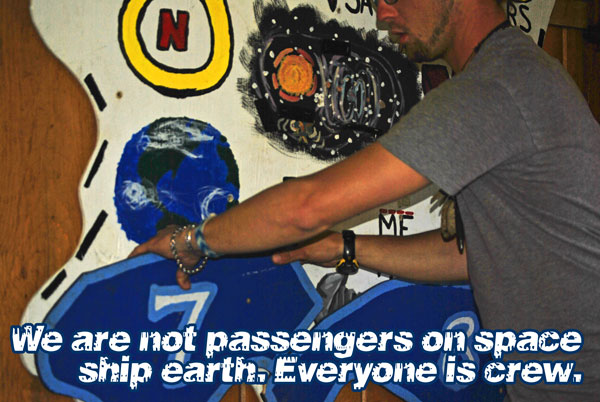
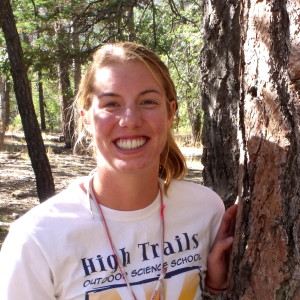
What students will learn over time is that the High Trails Manners Ladder isn’t actually a stand-alone ladder, it’s the first rungs of a larger ladder, the ladder of respect. Once students master these first rungs, they can move on to bigger ideas, remembering the respect their instructor showed to every individual in their group. Then they can start their own quest for respect, perhaps beginning with a stranger in line at the grocery store.
At High Trails Outdoor Science School, we literally force our instructors to write about elementary outdoor education, teaching outside, learning outside, our dirty classroom (the forest…gosh), environmental science, outdoor science, and all other tree hugging student and kid loving things that keep us engaged, passionate, driven, loving our job, digging our life, and spreading the word to anyone whose attention we can hold for long enough to actually make it through reading this entire sentence. Whew…. www.dirtyclassroom.com

Comments are closed.